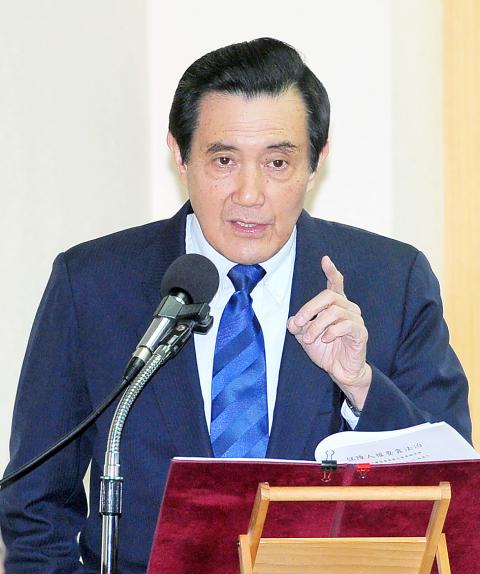Former president Ma Ying-jeou (馬英九) yesterday said political talk show pundits and the Ill-gotten Party Assets Settlement Committee threaten the nation’s rule of law.
While giving a speech entitled “Taiwan’s recent human rights issues — the protection of human rights relies on the rule of law” at the Chinese Association for Human Rights’ general assembly, Ma lashed out at pundits and the committee for harming the rule of law, despite Taiwan’s listing as the second-freest nation in Asia.
Ma said that some media pundits have long been making accusations against, and defaming, government officials in the name of freedom of speech.

Photo: CNA
They have become a special social stratum, to whom the court has been lenient, Ma said, lamenting that certain pundits have made millions of New Taiwan dollars by speaking on talk shows, but are a “negative factor” and “the killer of freedom of speech.”
The legislature’s passage of the Act Governing the Handling of Ill-gotten Properties by Political Parties and their Affiliate Organizations (政黨及其附隨組織不當取得財產處理條例) has also affected the rule of law, Ma said.
The Executive Yuan’s committee has power over the legislative, executive and judicial branches and has been taking questionable actions, including an order to freeze the capital of a particular political party, thereby impeding that party’s normal functioning, Ma said.
While the committee’s aim is for transitional justice, it violates the imperative that a nation operates under the rule of law, namely the principle of non-retroactivity, presumption of innocence, prohibition of bills of attainder and clarity of law, in order to avoid conflicts of interest, Ma added.
He also called into question the legitimacy of legislation concerning party assets, which he said was passed because the Democratic Progressive Party commands a majority in the legislature, without the input of the executive’s departments.
Insofar as Taiwan is considered by the international community a stable democracy, “is there really the need to walk on the path of transitional justice?” he said.
Tackling problems with unconstitutional procedures would not achieve transitional justice; worse, it would probably lead to democratic regression, he added.

A strong continental cold air mass is to bring pollutants to Taiwan from tomorrow, the Ministry of Environment said today, as it issued an “orange” air quality alert for most of the country. All of Taiwan except for Hualien and Taitung counties is to be under an “orange” air quality alert tomorrow, indicating air quality that is unhealthy for sensitive groups. In China, areas from Shandong to Shanghai have been enveloped in haze since Saturday, the ministry said in a news release. Yesterday, hourly concentrations of PM2.5 in these areas ranged from 65 to 160 micrograms per cubic meter (mg/m³), and pollutants were

Taiwan’s armed forces have established response protocols for a wide range of sudden contingencies, including the “Wan Chun Plan” to protect the head of state, the Ministry of Defense (MND) said today. After US President Donald Trump on Saturday launched a series of airstrikes in Venezuela and kidnapped Venezuelan President Nicolas Maduro, concerns have been raised as to whether China would launch a similar “decapitation strike” on Taiwan. The armed forces regularly coordinate with relevant agencies and practice drills to ensure preparedness for a wide range of scenarios, Vice Minister of National Defense Hsu Szu-chien (徐斯儉) told reporters before a

EVA Airways on Saturday said that it had suspended a pilot and opened an investigation after he allegedly lost his temper and punched the first officer several times as their plane was taxiing before takeoff at Los Angeles International Airport. According to a report published on Thursday by The Reporter, the incident occurred after the flight’s Malaysian first officer tried to warn the Taiwanese pilot, surnamed Wen (文), that he was taxiing faster than the speed limit of 30 knots (55.6kph). After alerting the pilot several times without response, the first officer manually applied the brakes in accordance with standard operating

Japanese Councilor Hei Seki (石平) on Wednesday said that he plans to visit Taiwan, saying that would “prove that Taiwan is an independent country and does not belong to China.” Seki, a member of the Japan Innovation Party, was born in Chengdu in China’s Sichuan Province and became a naturalized Japanese in 2007. He was elected to the House of Concilors last year. His views on the Chinese Communist Party (CCP) — espoused in a series of books on politics and history — prompted Beijing to sanction him, including barring Seki from traveling to China. Seki wrote on X that he intends